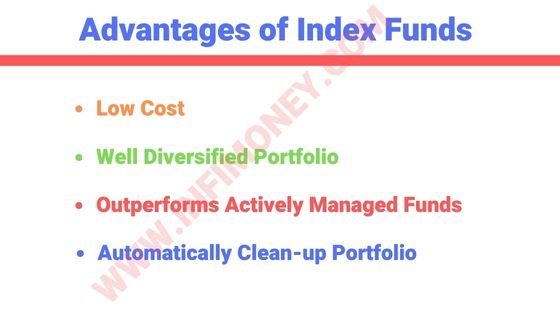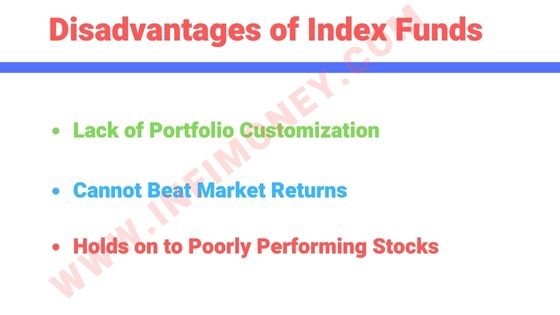Hi investors, in this post we will talk about investing in index funds.
Investing in stock market, which was once an option, is now slowly becoming a necessity. With declining interest rates in fixed deposits, which come nowhere close to meeting one’s financial goals, an average person is left with no other option but to invest in stock market.
The problem with investing in stock is that most of the average investors have no knowledge about investing, whereas too many investment products may be overwhelming and complicated to understand.
So what is the solution? If you listen to the advice of some of the most successful investors in the world like Warren Buffett, John Templeton and Peter Lynch, they have advocated that an average investor, with no knowledge about markets can still make good returns by investing in an index fund.
Citing an example of Vanguard Index Fund that tracks S&P 500 index of large US companies, Buffett said that index funds can give better returns than actively managed funds that are managed by fund managers and charge hefty fund management fee.
Does his theory stand true for all the markets in the world? and should you really consider investing in index funds? What are the advantages and disadvantages of investing in index funds? We will try to find the answers to all these question in this blog post.

What is a Index Fund?
Starting with a very basic question. What is an index fund? An index fund is essentially a mutual fund that imitates portfolio of an index.
For example, an index fund tracking Nifty as benchmark, will have the same 50 stocks in its portfolio, in the same percentage allocation as Nifty.
Since index funds track a particular index, they are called passively managed funds.
How does Index Fund work?
The working of an index fund is completely different from other actively managed funds. An actively managed fund tries to outperform (that is get higher returns compared to) its benchmark, index giving investors better returns over a long period of time. Index funds, on the other hand, simply mimic the performance of a benchmark index.
Unlike actively managed funds where there is a team of analysts, works day and night to find next investment opportunity, in case of index funds, the job of an index fund manager is simply to decide which stock to buy or sell in order to maintain the composition of the underlying index. Because of very simple nature of operation, index fund becomes very cheap, and thus have a low Expense Ratio.
Index funds can be very beneficial, especially for those investors, who do not have much knowledge about investing in stocks nor have the time to research and find a good, actively managed funds.

Advantages of Index Funds
Apart from simplicity of the product, an index fund has many advantages which are mentioned below:
Low cost
Every mutual fund has a cost of managing it, called the Expense Ratio, which is a measure of per unit cost of managing a fund.
Expense Ratio is calculated by dividing total expenses of the fund by its Asset Under Management
One of the biggest advantage of an index fund over an actively managed fund is its low expense ratio.
For an actively managed fund, the maximum expense ratio allowed by SEBI cannot be more than 2.5% of the weekly average Net Asset. On the other hand, for an index fund, the expense ratio is capped at 1.5%. Let us understand it in a better way using an example.
Example: Let’s say you have invested Rs.100,000 in an actively managed fund at NAV of Rs.10, bearing an expense ratio of 2%.
By the end of the year, the NAV has given a return of 12%, which means that Rs.100,000 invested in the fund have now become Rs.1,12,000. After the deduction of 2% charge, the actual return you get is Rs.1.09 lakh, which means you had to pay Rs. 2,240 as a cost of managing the fund.
On the other hand, if you invest the same amount of money in an index fund with an expense ratio of 1.5%, giving same returns, your total return after deduction of 1.5% charge would be Rs. 1,680.
The difference may not look significant at this point, but it can have significant impairment on the value of your investment over long period of time.
Clearly, index funds have much lower expense ratio, unless an actively managed fund significantly outperforms an index fund by a wide margin over longer period of time, it is always wiser to invest in index funds.
Well Diversified Portfolio
Since an index is composed of a wide variety of companies, from various sectors, investing in an index fund provides a well diversified portfolio of stocks, which in turn mitigates the investment risk by limiting your exposure to a single stock or sector.
As a result, if one of the stock or sector fails to perform, it does not hurt your portfolio’s performance significantly.
If you look at the weight distribution of the various sectors composing Nifty 50 index, you will find that it is composed of many sectors, largely contributed by sectors like Finance, Energy, IT, Consumer Goods and Automobile, contributing approximately 37%, 15%, 14%, 10%, and 6% respectively.
Among these sectors, Nifty has highest exposure to blue chips like HDFC Bank, Reliance Industries, HDFC, Infosys, ITC, ICICI Bank, and TCS.
All the above evidences clearly show that indices like Nifty is composed of well diversified, blue chip, large cap companies, making it a safer investment bet for long term.
Usually Outperforms Actively Managed Funds
There are many evidences that prove that most of the actively managed funds have failed to outperform index funds over long term.
If you look at past 10 years of US market data, you will find that in the past decade almost 82% of the largecap funds failed to outperform their benchmark index, smallcap funds performed even worse, where 88% of the funds failed to outperform their benchmark index. A strong evidence that investing in actively managed funds does not always guarantee better performance.
Automatic Clean-Up of Portfolio
Due to the manner in which indices are composed, the third advantage of investing in index funds is that it automatically cleans up its portfolio frequently, by owning outperformers and removing underperformers.
Since yesterday’s largecap blue chips may no longer be able to continue its performance for a longer time, they usually get replaced by new stock that are expected to outperform in the future. While investing in index funds, you don’t have to worry about staying invested in laggards.
All of the points stated above make index funds look like a hero, as if they are the solution to all your investing related problems, the elixir of life. Before you start painting a rosy picture about index funds, let me tell you, as every hero has a weakness, even index funds do suffer from certain drawbacks that you must be aware of before making an investment decision.

Disadvantages of Index Funds
As every coin has two sides, investing in index funds also has its own disadvantages, which are explained in detail below:
Lack of Portfolio Customization
One of the most obvious disadvantages of investing in index funds is the fact that you have to invest in a predefined portfolio, which is composed of all the stocks an index has, this takes away your ability to customize or change your portfolio as per your needs or financial goals. When investing in index funds, you have to buy an entire portfolio of stocks as it, with no freedom to make any changes whatsoever.
Cannot Beat the Market Returns
Unlike actively managed mutual funds, which aim at beating the market returns, Index funds on the other hand, are designed to mimic the movement of an index, not to beat their returns. But how does that make any difference? Well, there are times when the broader indices perform poorly, but some specific sectors do really well.
By investing in index funds you lose the opportunity to take advantages of sector specific growth and have to rely on movement of broader index in order to make meaningful profits from your investments.
Holding on to poorly performing stocks
Not every stock in the index performs well, There will always be some percentage of stocks that will perform poorly compared to others.
When you invest in an index fund, you are bound to invest in all the stocks that are part of index. While some of the stocks may do well, others may not. However, you still have no other option but to stay invested in such stocks even if they hurt your portfolio.
Should you invest in index funds?
Finally, the question is, is it worth investing in mutual funds? The answer is, it should definitely be a part of your portfolio. Don’t rely on index fund as the only source of generating passive income. As mentioned earlier, index funds sometime underperform, especially when the market is driven by few sectors, and broader index remain subdued.
In order to have the best of both worlds, it is always advised to invest in some other good quality stocks.
I hope you find this article useful and knowledgeable. Thank You for reading. Happy investing.